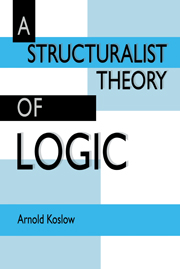Book contents
- Frontmatter
- Contents
- Preface
- Part I Background
- Part II Implication relations
- Part III The logical operators
- Part IV The modal operators
- 25 Introduction
- 26 Modality
- 27 Modals: Existence and nonextensionality
- 28 Special modals
- 29 The possibility of necessity-style modals
- 30 Modals revisited I
- 31 Quantification and modality
- 32 Modals revisited II
- 33 Knowledge, truth, and modality
- 34 The comparative strength of modals
- 35 Kripke-style systematization of the modals without possible worlds
- 36 Model functions, accessibility relations, and theories
- 37 Migrant modals
- Appendix A An implication relation for the integers in the programming language BASIC
- Appendix B Symmetric sequents as products of implication relations and their duals
- Appendix C Component-style logical operators and relevance
- Notes
- Bibliography
- Index
31 - Quantification and modality
Published online by Cambridge University Press: 05 May 2010
- Frontmatter
- Contents
- Preface
- Part I Background
- Part II Implication relations
- Part III The logical operators
- Part IV The modal operators
- 25 Introduction
- 26 Modality
- 27 Modals: Existence and nonextensionality
- 28 Special modals
- 29 The possibility of necessity-style modals
- 30 Modals revisited I
- 31 Quantification and modality
- 32 Modals revisited II
- 33 Knowledge, truth, and modality
- 34 The comparative strength of modals
- 35 Kripke-style systematization of the modals without possible worlds
- 36 Model functions, accessibility relations, and theories
- 37 Migrant modals
- Appendix A An implication relation for the integers in the programming language BASIC
- Appendix B Symmetric sequents as products of implication relations and their duals
- Appendix C Component-style logical operators and relevance
- Notes
- Bibliography
- Index
Summary
Quantifiers as modals
It is a familiar observation that the universal quantifier of, say, standard first-order theory behaves in a way that is very similar to the necessity operator or box in most standard modal systems. The universal quantifier acts on predicates, open sentences, or formulas in such a way that the quantification of a conjunction implies the conjunction of the conjuncts, ∀x(Px) implies Px, and several other familiar truths of quantification all combine to suggest strongly that the quantifier “∀x” has modal character.
Similar observations have been noted for the relation of the existential quantifier “Ex” and the corresponding modal, the diamond. Thus, it seems natural to think that “∀x” corresponds to some kind of □, and “Ex” corresponds to its dual, ◊. The network of correspondences becomes even more compelling when it is observed that (at least classically), “Ex” can be defined as “¬∀x¬”.
It seems to be no accident that the quantifiers look very much like modals. We need not try to force our understanding of quantification to make it appear as if quantification is a type of necessity (or possibility). The reason that universal and existential quantifiers count as modal operators is the same as in all the other cases that we have considered: There is a certain implication structure containing the items that are quantified, and quantification over those items is modal when the corresponding operator distributes over the implication relation, but fails to distribute over its dual.
Information
- Type
- Chapter
- Information
- A Structuralist Theory of Logic , pp. 312 - 317Publisher: Cambridge University PressPrint publication year: 1992
